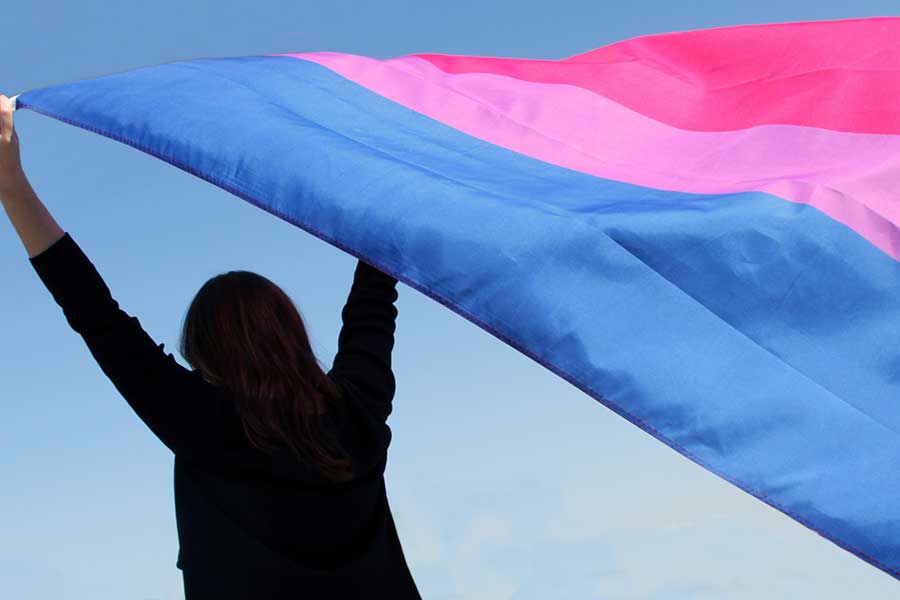Bi Visibility Day promises to bring some well-deserved attention to an often-overlooked and occasionally misunderstood part of the LGBTQ community.
The event will be held 6 p.m. Sept. 23 at William Way LGBT Community Center, 1315 Spruce St. The Bisexual Pride flag will be raised and there will be brief remarks from community members, including Amber Hikes, director of the Mayor’s Office for LGBT Affairs, and Katie Schank, a therapist at Mazzoni Center.
Afterward, attendees are encouraged to head over to the Toasted Walnut, 1316 Walnut St. for conversation and drinks.
This year marks Philadelphia’s third-annual celebration of Bi Visibility Day. It was organized by a handful of local residents, including Steven Johnston, who founded the group Philly Bi Visibility in 2016, and Janice Rael, an out bisexual and activist from South Jersey.
Bi Visibility Day may not draw crowds as large as Gay Pride, but it is especially meaningful to people who identify as bisexual, explained Terri Clark, prevention services coordinator at Action Wellness.
The event gives bisexuals a kind of permission to come together as part of the larger LGBTQ community, she said, adding it’s also a way to educate other identities.
“It gives the rest of the lesbian, gay, transgender and our hetero allies the opportunity to make the ‘B’ visible, to see that and to learn more and more about it.”
In fact, said Clark, there are plenty of people whose attraction, behavior or identity could be described as bisexual.
“We as a bi community often talk about the ‘bi umbrella.’ Under it are people who might identify as queer or pansexual or homoflexible or heteroflexible.”
Bisexual individuals are frequently misidentified based on the gender of their partner, Clark noted. A bisexual woman dating a man, for example, is assumed to be heterosexual.
But there are also persistent myths about bisexuality that stymie understanding and acceptance, she said. These include the idea that bisexuals are attracted to all genders equally, that they are just confused or that bisexuality simply doesn’t exist.
“I think that peers within the lesbian, gay and transgender communities often buy into those myths,” Clark said. “When people identify, when they disclose, when they come out as bisexual, the response from the community is based a lot on those myths.”
Those beliefs, when taken to an extreme, amount to what Clark calls “biphobia.” One way to counter that phenomenon is to be open and out and to connect with others, she said.
That’s an aspect of Bi Visibility Day that Megan Crofford, who’s working on a Ph.D. in human sexuality at Widener University, is looking forward to.
“It’s an opportunity to celebrate the uniqueness of being bisexual and a chance to really be visible among other people that you might not always get to see in the community or recognize how much you have in common with them,” said Crofford, who also works as a therapist at Mazzoni Center.
Bi Visibility Day is also a good antidote to what Crofford called “monosexism.” That, she explained, “is an understanding and approach to human sexuality that views individuals as either heterosexual or lesbian or gay.”
The problem with monosexism is that “it reduces that spectrum of human sexuality that we know is such a wide range of things to just this binary of heterosexual or homosexual.”
Crofford added that she’s observed firsthand the negative effects such misguided attitudes have on bisexuals. “All 15 participants in my study highlighted bisexual erasure as a pervasive part of their experience,” she said. “Five of them specifically brought up Bisexual Visibility Day as an important way for them to come out to people, to affirm themselves.”
That points to a significant aspect of the event: the sociability. While Bi Visibility Day has a political aspect, it is also meant to be fun.
“As many challenges as there may be, I love being bisexual and I wouldn’t want to change that for anything,” Crofford said. “And being able to celebrate that with others who feel the same is really a unique and special opportunity.”
For more information, visit www.facebook.com/PhillyBiVisibility.

